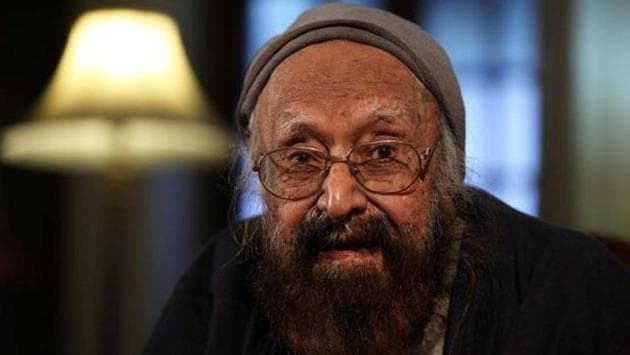Remembering a simple-minded Sardarji
A new anthology of Khushwant Singh’s writings displays his wit, wisdom, and commitment to democracy and pluralism
Earlier this year, the Supreme Court threw out a petition demanding that jokes featuring Sikhs be banned. That such a petition had been entertained at all would have appalled the best known Sikh writer of modern India, Khushwant Singh. Khushwant was an astonishingly versatile man of letters; his oeuvre included scholarly works of history, romantic novels, translations of poetry, and collections of jokes. Apart from publishing numerous books he wrote a popular newspaper column for many years.

I have just finished reading a superbly curated selection of Khushwant Singh’s writings. Entitled Me, The Jokerman: Enthusiasms, Rants and Obsessions, this posthumous collection has been put together by his daughter, Mala Dayal, a highly regarded editor herself. The book contains several essays on humour, with Khushwant writing that his best jokes were unprintable because they had to do with sex. Then he adds: ‘My second best jokes are about my own community, the Sardarjis. At one time they had the confidence to laugh at themselves. No longer so. They have become as touchy as Tamil Brahmins who happily laugh at jokes about Marwaris, Chettiars, Bengalis, Parsis and Mian-bhais; but you tell one joke about them and they are up in arms’.
In another essay, Khushwant comments: ‘We Indians may have lost our sense of humour but we still have a rich laboratory of materials to work on. Every third Indian is a clown in his own right: self-esteem, immodesty, sanctimoniousness, name-dropping and verbosity make a golden treasury of the ridiculous. We could study all these aspects, channel them into stories and then grant degrees to the more laugh-producing dissertations. We could make a very spectacular start by awarding doctorates even before the courses in humour are launched by conferring on our politicians degrees of Ha Ha Honoris Causa!’
Khushwant Singh lived for several years in Bombay, that city of extremes, while editing the then widely circulated Illustrated Weekly of India. Here he met a businessman who, upset with the city’s congestion, slept in his yacht offshore. ‘If every Bombayman owned a yacht’, reflected Khushwant, ‘we could walk over the sea to Karachi’. Had he been around now, he might have added: ‘If every Mumbaikar could build a twenty-seven storey house for himself, we could put them on top of each other and reach Mars without the help of ISRO’.
This always readable anthology ranges widely over the terrains of history, politics, religion, literature, and nature. Khushwant had in his head a vast storehouse of poetry in English, Urdu, Hindi, and Punjabi. The book also displays his knowledge of Christian, Hindu, Muslim and of course Sikh scriptures; there is a lovely piece on the Sikh mystic Bhai Vir Singh, of whom Khushwant writes: ‘The sense of humility never left him and appears like a refrain in many of his verses’.
Although written decades ago, some essays in this book speak directly to India today. In 1969, after a wave of Hindu-Muslim riots, Khushwant commented: ‘Distort your facts, inject a dollop of pride in your own race and religion, prejudice and contempt for that of others and you have witches’ brew of hate which can easily be brought to boil’. He himself believed that ‘it is both historically and morally unfair to cater to chauvinistic pride and prejudice. If you brainwash the younger generation with this venomous mixture of distorted fact, fancy and specious argument, you will forever be the real authors of communal discord. You will be the real perpetrator of what has happened in recent weeks in many cities and towns of Gujarat — the murder of the spirit of Gandhi. If we fail to make ourselves into one nation, you will be the authors of that failure’.
An essay from the late 1970s observed that many states were ruled by ‘zealous Hindu bigots sporting caste marks on their foreheads. Muslim friends advise me that if I mean to retain my image as a friend of the Muslims, I must not write anything critical pertaining to their Personal Law—including polygamy and the lesser status that their women (in comparison to others) have been relegated to.’
Also strikingly contemporary is an unpublished diary of the year 1980, which contains this paragraph on the Central Government’s shenanigans in August of that year: ‘After ridding itself of a recalcitrant Chief Minister in Sikkim, subverting Farooq Abdullah’s government in Kashmir, it suborned the loyalties of NT Rama Rao’s followers in Andhra Pradesh’. The prime minister at the time was Indira Gandhi. As an increasing number of commentators have noted, in his authoritarian tendencies and his desire to manipulate public institutions, Narendra Modi resembles Nehru’s daughter. Certainly, his central government, like hers, has used partisan governors to dismiss or undermine state governments ruled by Opposition parties.
Khushwant’s own commitment to democracy and pluralism, while on the whole sound, was vitiated by his naivette. Like some other writers, he was susceptible to flattery; if powerful men spoke sweetly to him he would trust their words more than their actions. Thus an essay on MS Golwalkar ends with the RSS ideologue inviting him to Nagpur to continue their conversation. Reflecting on this invitation, Khushwant remarks: ‘Maybe I can bring him around to making Hindu-Muslim unity the main aim of the RSS. Or am I being a simple-minded Sardarji?’
He was, indeed. Khushwant was warm, wise, witty, and (in terms of his cultural sensibilities) well-rounded, but, when it came to assessing power-hungry ideologues, utterly simple-minded. In 1971 he thought he could convert that bigot and chauvinist, MS Golwalkar, to the cause of Hindu-Muslim harmony. A few years later, he was to see in another malign individual, Sanjay Gandhi, the saviour of the nation itself.
Ramachandra Guha’s books include Gandhi Before India
The views expressed are personal
Follow the author on Twitter @Ram_Guha





